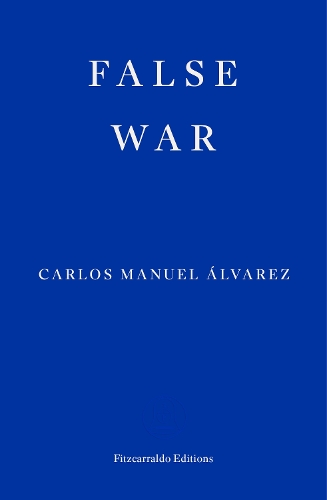
False War
(Paperback)
Publishing Details
False War
By (Author) Carlos Manuel lvarez
Translated by Natasha Wimmer
Fitzcarraldo Editions
Fitzcarraldo Editions
2nd December 2025
28th August 2025
United Kingdom
Classifications
General
Fiction
Fiction in translation
863.7
Physical Properties
Paperback
268
Width 125mm, Height 197mm
Description
The characters inFalse Warare castaways on dry land, stranded on no man's land. Some of them want to leave Cuba and can't, others left and never quite finished getting anywhere. They live in a sort of limbo, a perpetual impasse between reality and desire, past and future, country of origin and country of destination - awaiting a confirmation or, purely and simply, some respite. Something to keep reminding them that life is possible.
What is the difference between an immigrant, someone living in exile, and a refugee Doomed to chaos, anguish or tedium, the perennially displaced are beleaguered by a world that - in that simulation of advancement towards the illusion of a consumer society - reminds them that there is no place for them at every turn. In this choral novel, the characters appear to move between Cuba, the United States, Mexico, France or Germany with confidence, while in reality they all feel paralyzed, immersed in a fake war waged without any real passion or any authentic ideas.
Structured with an atomized narration that brilliantly reflects the disintegration that comes with uprooting, full of tenderness, disenchantment and melancholy,False Waris an extraordinary novel that confirms Carlos Manuel lvarez as one of the indispensable voices of his generation.
Reviews
The dissidents, migrants and exiles ofFalse Wartravel the world in search of some kind of refuge, but the cities they arrive in are places of purgatory, allegorical waystations of the permanently displaced, where everyone is an outsider, caught between landfalls, hurrying nowhere: Brightness inside, darkness outside until we crash. This is a timeless and urgent work, in turns lyrical, hardboiled, tender, fragmented. It maps a way forward for the twenty-first century novel.
Jeet Thayil, author ofNames of the Women
What happens when exile becomes style, and style becomes a kind of homeFalse Waris that question asked with tenderness, fury and precision.
Carlos Fonseca, author ofAustral
A new Latin American literature is here: With precocious mastery of a paragon of narrative resources and an overwhelming sensibility, Carlos Manuel lvarez portrays the only identity that truly matters not the national one, but the human one.
Emiliano Monge, author of What Goes Unsaid
How do we recount the story of migration Where does it begin and where does the journey end Can a story have as a protagonist the very act of migrating due to exile or dissidence In his new novelFalse War, Carlos Manuel lvarez does exactly that: he puts the act of fleeing at the center, and does so through characters that find themselves in the midst of a radical transfer.... Time in this novel passes in a space that hasn't yet been occupied an impasse of open possibilities and discovery.
Julieta Venegas,Gatopardo
A seething race across countries and heads, from Mexico Citys congested streets to Berlins ghostly quiet, and on. With exact translation by Natasha Wimmer, the book is like a collection of migrant tales, inextricably woven together in harmonious echoes sometimes bound together by character, but often by similar preoccupations with displacement, identity, and desire. Alvarezs writing is mesmerizing his rhythm propulsive, his vision unflinching. A compelling and necessary book that lingers in the mind long after reading.
Leo Boix, Morning Star
lvarez paints this generational tapestry with lush and colorful prose that is exuberant and rich, with brushstrokes of infinite tenderness, occasional violence, humour tinged with nostalgia, and critique towards a society that squashed the dreams of its residents in its attempt to reach the goal of utopia. The pages that take place in Mexico City and Berlin can serve as a clear example of how we find ourselves with an uncommon narrator, capable of speaking in his own voice about the eternal topics of loss and exile.
Juan Cervera,Rockdelux
InFalse War, defeat is like an ocean that connects stories from different narrators in different parts of the globe that all converge in the present, forming an archipelago in which the collective trauma of loss ends up emerging not as a national singularity but as a sign of the times, one of the scars of humanity today.
Nelson Crdenas,Revista UNAM
Natasha Wimmer is a translator of contemporary fiction and literary nonfiction from Spanish to English. She spent four formative years in Spain as a child and concentrated in Romance Languages and Literature as an undergraduate at Harvard University. She is a regular visiting lecturer at Princeton University and Columbia University, and she has written reviews and criticism forThe Believer, theNew York TimesandThe Nation, among other publications. She is the recipient of an NEA Translation Grant, a PEN Translation Award and an Award in Literature from the American Academy of Arts and Letters. She lives in Brooklyn, New York, with her husband and two children.
Author Bio
Born in 1989, Carlos Manuel lvarez is a journalist and author. In 2016 he co-founded the Cuban online magazineEl Estornudo. He regularly contributes to theNew York Times,Al Jazeera,Internationale,BBC World,El MalpensanteandGatopardo. He was selected among the best twenty Latin American writers born in the 1980s at the 2016 Guadalajara Book Fair and in 2017 he was included in the Bogota39 list of the best Latin American writers under 40. In 2021 he was named inGranta's Best of Young Spanish-Language Novelists list. False War is third book to appear with Fitzcarraldo Editions afterThe Fallen(2019), a novel, andThe Tribe(2022), a book of reportage about Cuba.
